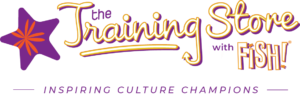5 FISH! Tips to help build self-awareness
Surveys show 95% of us think we are self-aware. Unfortunately, research shows only 10-15% of us really are. Self-awareness is the ability to see yourself accurately. It’s understanding your personality, feelings, strengths, weaknesses, and behaviours. It’s recognizing how your actions impact others. Self-Awareness is a big part of The Fish Philosophy.
Psychologists say self-awareness is a foundation for happiness and success. Seeing yourself clearly helps you build stronger relationships and communicate more effectively. You’ll make wiser decisions and be a better leader.
Self-awareness is key to living The FISH! Philosophy. When you understand your emotional reactions, you are less likely to be controlled by them and better equipped to Choose Your Attitude in a way that works best for the situation.
When you are aware of your judgments, you see where others are coming from and what they need. Then you can Be There for them and Make Their Day. Self-awareness helps you Play in a way that’s appropriate for your workplace.
Self-awareness is easier for some than others. But we can all improve. Here are some basic tips:
Ask for help
No one knows your feelings better than you. But when it comes to how those feelings influence your actions, others see your impact more accurately than you do. For example, studies show coworkers are much better than you at recognizing how your personality affects your performance.
Ask people you trust—friends, coworkers, mentors—for feedback on your impact. Describe the impact you want to have, and ask them to tell you when you achieve it and when you don’t. Thank them for their coaching; they are helping you to be the person you want to be.
If you receive negative feedback, ask for specific examples. This will help you focus on how you can improve that behaviour vs. seeing it as an unchangeable flaw.
Trusting relationships is key. Be There for the people around you and they will give you sincere, useful feedback.
Learn » Reasons to be Authentic.
Focus on action
Self-awareness starts with reflection but doesn’t end there. Asking why something happened—as in “Why did I lose my temper?” or “Why does he annoy me?”—only goes so far.
Highly aware people also ask “what” they can learn from the situation and “how” they can improve it. Say you receive negative feedback. Instead of asking, “Why did they say this about me?”, ask, “What can I improve next time to get a positive response?”
Take a step back
In stressful situations, it’s easy for your emotions to hijack your brain. Before you send an angry email or speak an angry word, stop for a moment. Turn away from your computer, look out the window, close your eyes, or take a walk—anything to put distance between you and your feelings.
Ask yourself, “How will my response improve the situation? How might it make things worse? Is it in line with what I hoped to achieve?”
It helps to name the emotion you are feeling. Watch it and let it be, like a neutral observer. Rather than say, “I’m frustrated,” say, “I’m experiencing frustration.” Treat your emotions as data that will guide you to a productive response.
Recognize the signs
Your brain is wired to look for what it has encountered before. If you had a run-in with someone in the past, you’re more likely to see what they say today as an insult or slight.
Be ready when your perceptions are about to push your emotions in a direction you don’t want. Say you’re meeting with people you usually disagree with. Plan ahead. What might push your buttons? How do you want to react? Practice how you will respond.
Question your assumptions. Let go of feeling you have to be right. Rather than judging every statement, see it as a different viewpoint. Consider how the other person’s experiences shape their opinions.
Your mindset matters
Living the FISH! practices help build awareness. When you understand you control your attitude—not the other way around—it’s easier to find helpful, positive attitudes. When you Play, you see a lighter approach that makes the day’s challenges seem less overwhelming.
When you focus on being there, you see more clearly what others need from you. When you are in a Make Their Day mindset, you see opportunities to lift people’s spirits you never saw before. Our new FISH! eLearning program is a great way to build self-awareness. It helps you hone the skills that strengthen relationships, teamwork, and trust. Thank you to the team at ChartHouse Learning founder of The FISH Philosophy for this very useful article.

